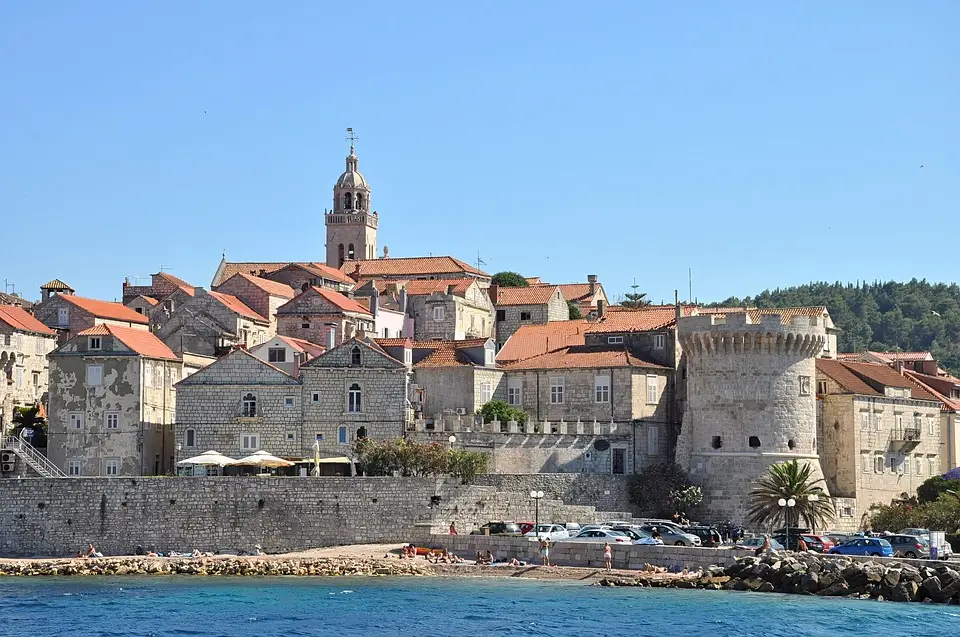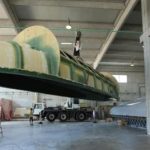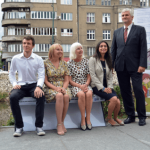As Poslovni Dnevnik/Marta Duic writes, the island of Korcula is the home of OPG Komparak, which is engaged in the production of honey, olive oil, and recently – strong alcoholic beverages.
As the owner Vlaho Komparak says for himself, he decided to work on the family farm, nurturing the principles of “his ancestors” as well as local tradition with a twist of modern technology, and thanks to this approach, today, OPG Komparak creates and produces a whole range of products that are all the very proud owners of eco certificates.
Chickens, turkeys, donkeys and sheep roam around the farm freely, and this OPG also boasts a vegetable garden and a spice garden. It is a farm where figs grow, indigenous varieties such as Zamorcica and Bjelica, there are 620 olive trees, also the indigenous types such as Lastovka and Oblica, and they also have 300 hives and a shop where honey can be tasted and purchased, and customers are free to get better acquainted with the production process and the product range.
You can also see life in the hive because they have a glass enclosure, more precisely a beehive built right next to the shelves with products in the tasting room, which is a fantastic view into the busy lives of one of planet Earth’s most spectacular inhabitants.
“This year and 2020 have been devastating for beekeepers, I can literally say that there have never been worse years in the history of beekeeping. Weather disasters, temperature extremes burning the flowers, one above-average warm day is enough and everything disappears… By the way, our farm produces 16 to 17 tonnes of honey in its best years, and during the season it all disappears in less than a month. Today we have about 20 products in our range,” they stated from OPG Komparak.
Vlaho’s sister is a designer by profession, so she took care of the visual identity of the product, and Komparak has been running this business successfully for 12 years now. They offer eight types of honey, even local bitter honey which is characteristic of both Korcula and the nearby Peljesac peninsula.
However, the best-selling product they have is the one made of mandarin, and Komparak says that it always disappears from the shelves first. Guests come thanks to the cooperation with various agencies that OPG Komparak has, and in addition to honey and other bee-made products, this versatile farmer also makes olive oil and strong alcoholic beverages in his brand new distillery.
When it comes to oils, Vlaho says he has 1,500 to 2,000 litres a year and more than two-thirds of it is sold it to regular customers. “In normal years, we also have a honey machine for honey production, but this year it’s unfortunately empty. Mandarin honey is the most sought after among the English and Americans, and they’re the most frequent guests in our tasting room. Due to climate change, I decided to change the olive varieties as well, now I’m switching to the Moroccan type,” Komparak stated.
His record-breaking tasting room year was of course, pre-pandemic 2019, when it was visited by 7,312 guests, and more than 6,000 of them passed through this year.
Apart from selling his products on his doorstep and on the island of Korcula in general, OPG Komparak’s honey and gin, with the significant “beekeeping” name Trut has recently been sold in Vivat stores in Zagreb and Split and in several smaller specialised stores. Their gin has also entered the offer of the boutique hotel Lesic-Dimitri, and they plan to break into the market of the capital soon.
“We produce dry Trut gin in two variants: lemon and mint and bitter orange, which we procure from subcontractors. This year we started with a small amount, but the gins delighted and conquered the island, and Zagreb’s caterers and others from the hospitality sector are also showing great interest.
For example, a cafe in Lumbarda took 100 bottles, and we also have a benefit for our catering and hospitality partners – we give them dried spices and citrus fruits from our family farm “, Komparak pointed out. The main ingredient, bitter orange that is from the island, is dried in its own dryer and they will soon have ten tonnes of bitter orange for a new round of gin,” added the Korcula-based agribusinessman.
“Our small distillery can produce up to 20 litres of gin a day, and through European Union (EU) funds, we have managed to equip a small and large distillery worth around one million kuna,” Vlaho Komparak concluded.
For more, check out Made in Croatia.










